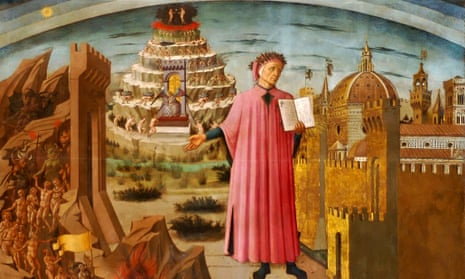Regular readers of this column may recall that I get pretty excited about Dante. This usually involves recommending a new translation rather than critical work on the 14th-century poet; you’re not, I presume, going to be taking an exam on him. But he is such a complex poet – the number of people who have devoted a lifetime to the study of him is extraordinary – that even the casual reader could do with a guide; rather as Dante himself had guides to the afterlife.
And here is just the thing for the nonacademic Dante reader: a short, pithy guide by academics who know what they’re talking about and which opens up and refreshes the work as well as our reactions to it.
Hainsworth and Robey begin with Ulysses’s speech in “Canto 26” of the Inferno: “Fatti non foste a viver come bruti … ” Or in their translation: “You were not made to live like brute beasts, / but to pursue virtue and knowledge.” As the book reminds us, these lines helped carry Primo Levi (in If This Is a Man) through his darkest times in Auschwitz. They represent the core principles that motivated Dante himself, and yet, Ulysses is speaking as one of the eternally damned: his body is hidden, enveloped in a double-tongued flame, and Dante cannot address him directly. Ulysses’s injunction is freighted with ironies and complications. The business of sending sinners to judgment is not a simple one.
The authors do a great job of alerting us to the many layers of meaning, and of possible interpretation, to Dante’s work without making it sound intimidating; they emphasise its richness and help us grasp why this poem has fascinated readers for seven centuries.
They offer numerous reasons. For one thing, although it is steeped in philosophy and theology, the work is also intensely autobiographical, in a way that had not been seen since Peter Abelard in the early 12th century: “No other writer, not even Augustine in the Confessions, had projected himself in the way Dante does in The Divine Comedy, as an exceptional exemplary figure, drawn out of moral and spiritual squalor to become the voice of righteousness and truth, while at the same time retaining his historic specificity as an individual.”
Another aspect Hainsworth and Robey draw attention to is the rhyme scheme, Dante’s celebrated terza rima. I had always acknowledged its capacity for mixing suppleness and strength, but had not appreciated the point made in this book: “It is ... one reason why the text of the Comedy proved from the beginning remarkably stable in comparison with many others from the middle ages, even though we have no manuscript in Dante’s hand ... it is almost impossible to take out lines or insert them at all convincingly.”
This makes a great deal of sense, and accounts for the solidity and unity of the work. It is the kind of thing that all readers of the poem feel without necessarily being able to put a finger on exactly why they feel it, and helping us work out our own responses to the poem is one of the things this small book does so well. At no point do you feel talked down to, which is quite an achievement considering the almost unimaginable inspiration behind the Comedy. And they knit his other achievements into the narrative – for this is a guide to Dante, not just the Comedy – with deftness.
There is something almost uncanny about how this book makes the work of a long-dead poet from another culture come alive: it even helps the non-Italian speaker get to grips with the way Dante uses language (he was, like Shakespeare, a great linguistic innovator). “All men desire to know,” as Dante quotes Aristotle in his Convivio; and this book imparts knowledge as well as encouraging us to find it ourselves.

Comments (…)
Sign in or create your Guardian account to join the discussion